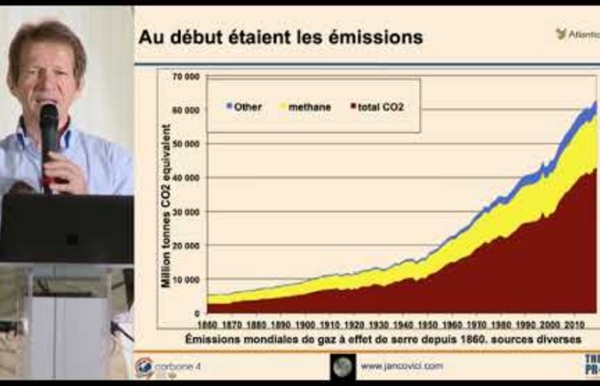



http://www.youtube.com/watch?v=xMpTDcuhl9w
Related: Une énergie d'avenir, vraiment ? • Conséquences • Sept 2020 • EPR (de Flamanville et d'ailleurs) • JancoEnviros and climate scientists continue their fight over nuclear power More than 300 environmental, peace, and anti-nuclear groups and leaders published an open letter this week urging four prominent climate scientists to stop “embracing nuclear power” as a tool for curbing climate-changing pollution. In response, one the four scientists reaffirmed his reluctant support for nuclear power, denying that he embraces the technology, but saying there’s “no justification” for claims it could never become safe or affordable. The debate among environmentalists over nuclear power flared up in November, when the four scientists published a letter calling for increased development and deployment of “safer nuclear energy systems.” The letter was written by some of the climate community’s best and brightest: NASA scientist-turned-activist James Hansen, Ken Caldeira of the Carnegie Institution for Science, Kerry Emanuel of MIT, and climatologist Tom Wigley.
Cyclone Idai lays bare the fundamental injustice of climate change A humanitarian catastrophe is underway in Mozambique, Malawi, and Zimbabwe as the full scale of devastation from Cyclone Idai becomes more clear. The World Meteorological Organization said Idai, which made landfall five days ago, could become the worst tropical cyclone on record in the Southern Hemisphere. Mozambique President Filipe Nyusi fears that 1,000 people may have died in his country alone.
Why hasn’t California banned fracking yet? By Joseph Winters on Sep 28, 2020 at 3:55 am Alongside California Governor Gavin Newsom’s headline-making announcement last week that he would ban the sale of gas-powered cars by 2035, he also said he supported a ban on new fracking permits by 2024. The announcement came in the middle of one of California’s most devastating fire seasons on record — thousands of blazes have consumed more than 3.6 million acres of land and claimed at least 26 lives. Earlier this month, Newsom declared them a “climate damn emergency,” pointing to the climate crisis’ tendency to make extreme events like wildfires more likely and more dangerous. In response, he has promised Californians his cabinet would “step up our game” and “fast track our efforts” on climate.
Nuclear plant spills radiation into Lake Michigan Last summer, a leaky tank led to the shutdown of the Palisades nuclear power plant in Michigan. So plant owner Entergy patched up the leak, fired back up the reactor, and hoped for the best. Unfortunately, the best did not materialize. The tank began leaking again. But no worries, thought the Einsteins at Entergy, it was only leaking a gallon a day. That was OK, they figured, because the NRC had allowed it to leak up to 38 gallons a day. Climate change is altering the color of the oceans This story was originally published by Atlas Obscura and is reproduced here as part of the Climate Desk collaboration. Climate change doesn’t just happen in the air, in the dirt, or in the fearsome pages of damning studies. It happens before our eyes. And so, as our planet continues to warm, our oceans will turn deeper shades of blue and green, according to research published Monday in the journal Nature Communications.
double trouble This Oregon forest was supposed to store carbon for 100 years. Now it’s on fire. By Emily Pontecorvo and Shannon Osaka on Sep 18, 2020 As fires ripped through the West this month, displacing families and releasing a thick, choking cloud of smoke that reached all the way to Europe, some scientists began to worry about yet another loss. Thousands of acres of forest, maintained to offset greenhouse gas emissions, might be going up in smoke. Claudia Herbert, a PhD student at the University of California, Berkeley, who is studying risks to forest carbon offsets, noticed that the Lionshead Fire — which tore through 190,000 acres of forest in Central Oregon and forced a terrifying evacuation of the nearby town of Detroit — appeared to have almost completely engulfed the largest forest dedicated to sequestering carbon dioxide in the state. The project, owned by the Confederated Tribes of Warm Springs, spans 24,000 acres. Before the fires, the state of California had issued more than 2.6 million offset credits based on the carbon stored in its trees.
One of the awful things about a nuclear meltdown could be the traffic It’s hard to imagine a worse traffic jam than the traffic jam that slows your escape from a nuclear meltdown. The U.S. Government Accountability Office is warning other federal agencies that they need to be thinking about that scenario as they plan emergency responses to nuclear accidents.
The World's Oceans May Heat Up 60 Percent More Than Previously Estimated Just a few weeks ago, the United Nations Intergovernmental Panel on Climate Change warned about rapidly increasing ocean temperatures. Now, a new report suggests that our waters may be warming by 60 percent more than even the IPCC study found. The ocean covers 71 percent of the planet, and its temperature patterns are critical for predicting future climate change. The IPCC report found that we have a little over a decade to keep global warming to a maximum of 1.5ºC. This means climate emissions have to be cut by 20 percent by 2030 — and by 2075 those emissions must be zeroed out — in order to keep global warming from exceeding 2ºC above preindustrial levels.
The idea of a ‘natural’ disaster is going up in flames By Kate Yoder on Sep 16, 2020 Wildfires recently turned the West Coast into a hazy orange hellscape, scorching a record-breaking amount of land in California and blanketing the whole region with lung-clogging smoke. The fires have already burned thousands of houses, driven Oregonians from their homes, and killed dozens of people. And it’s not even peak wildfire season yet.